Navigating Ethical Differences in Indian and Chinese Markets
VerifiedAdded on 2019/10/31
|12
|3519
|372
Report
AI Summary
The assignment highlights the importance of understanding cultural differences when conducting business internationally, particularly in Chinese and Indian markets. Implementing ethical practices without considering these differences may backfire and harm a Western organization's reputation. To succeed in cross-cultural business relationships, it is essential to understand and respect local cultures and values. This requires adapting ethical practices to suit specific markets and regions.
Contribute Materials
Your contribution can guide someone’s learning journey. Share your
documents today.

Cultural Reflective Journal
Secure Best Marks with AI Grader
Need help grading? Try our AI Grader for instant feedback on your assignments.
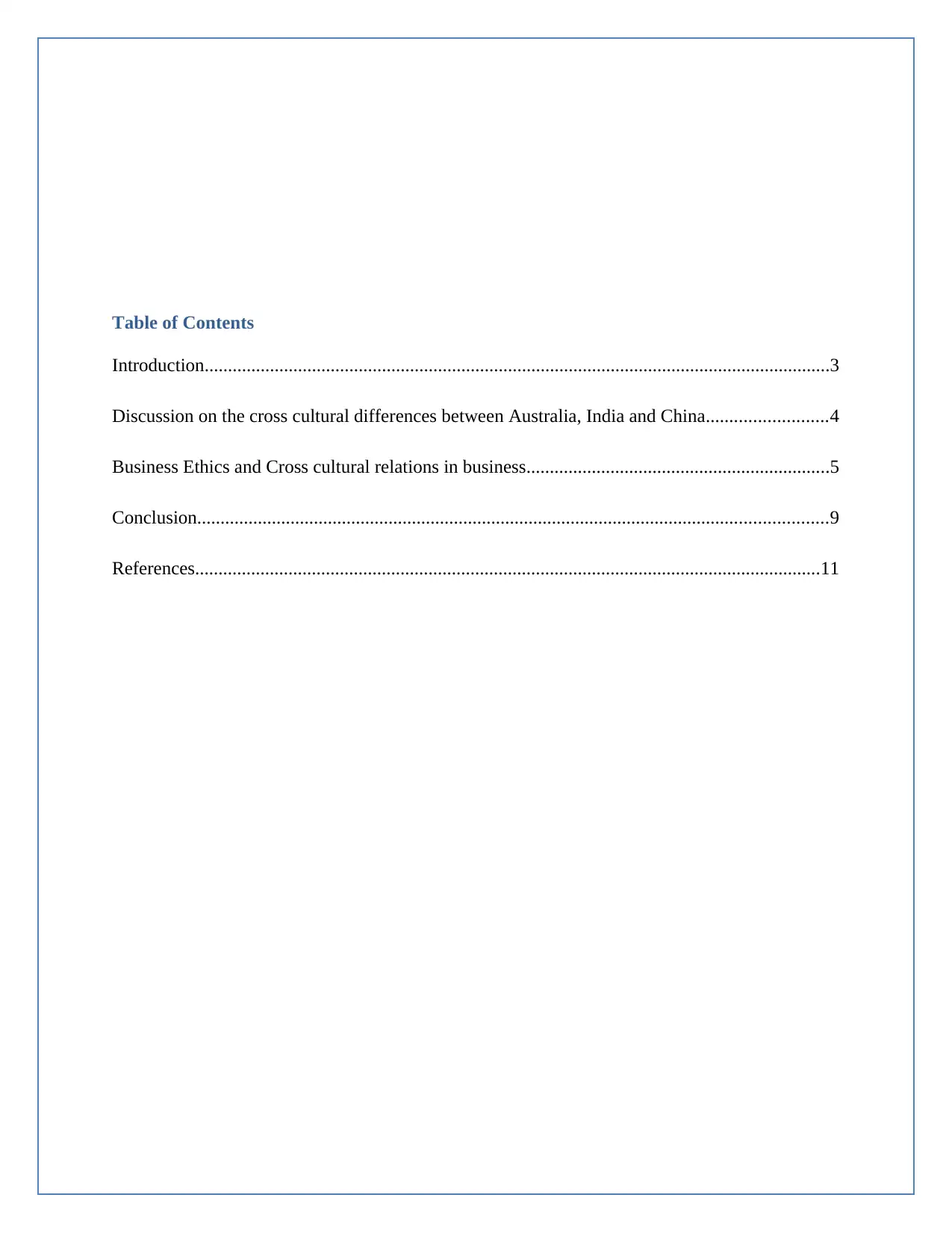
Table of Contents
Introduction......................................................................................................................................3
Discussion on the cross cultural differences between Australia, India and China..........................4
Business Ethics and Cross cultural relations in business.................................................................5
Conclusion.......................................................................................................................................9
References......................................................................................................................................11
Introduction......................................................................................................................................3
Discussion on the cross cultural differences between Australia, India and China..........................4
Business Ethics and Cross cultural relations in business.................................................................5
Conclusion.......................................................................................................................................9
References......................................................................................................................................11
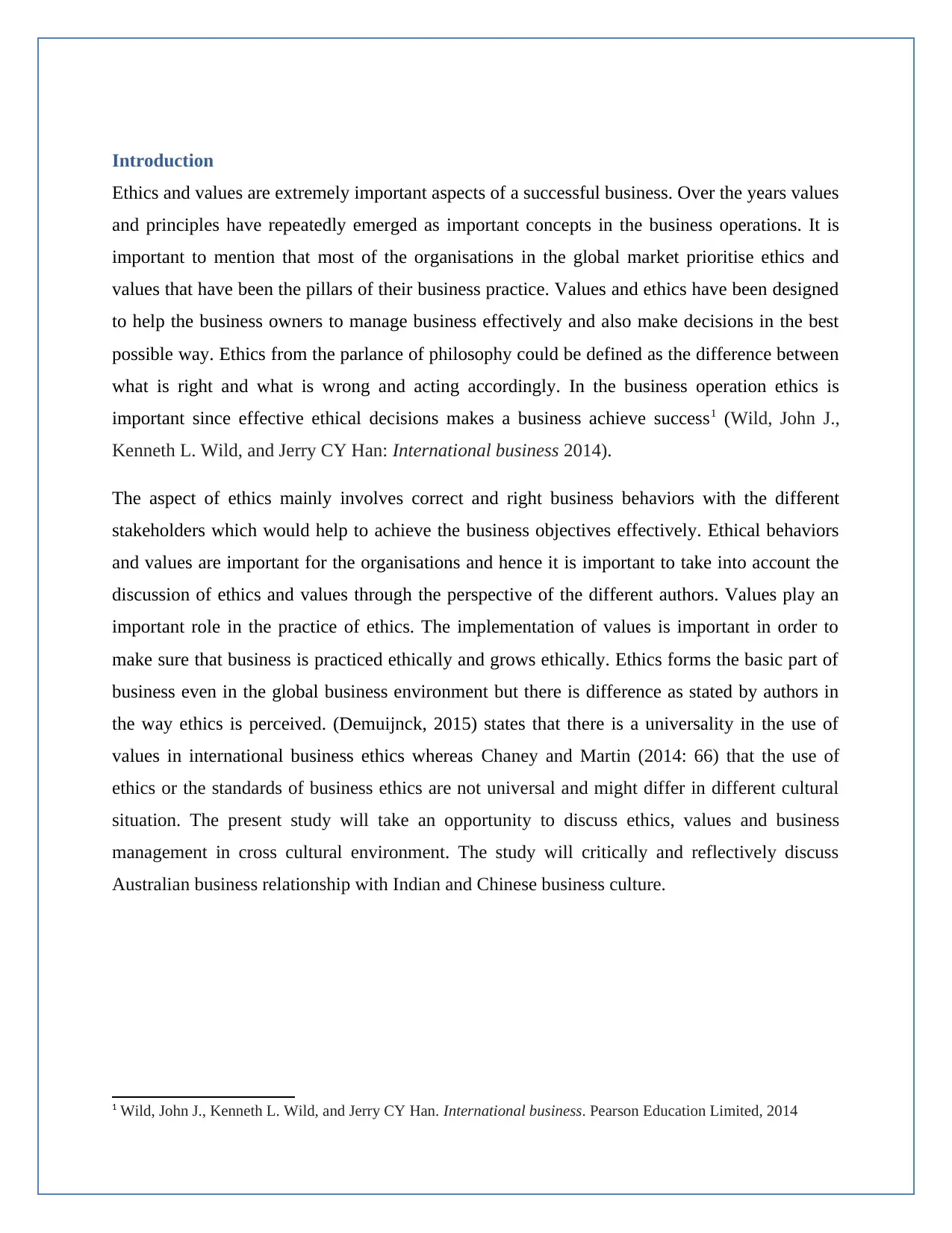
Introduction
Ethics and values are extremely important aspects of a successful business. Over the years values
and principles have repeatedly emerged as important concepts in the business operations. It is
important to mention that most of the organisations in the global market prioritise ethics and
values that have been the pillars of their business practice. Values and ethics have been designed
to help the business owners to manage business effectively and also make decisions in the best
possible way. Ethics from the parlance of philosophy could be defined as the difference between
what is right and what is wrong and acting accordingly. In the business operation ethics is
important since effective ethical decisions makes a business achieve success1 (Wild, John J.,
Kenneth L. Wild, and Jerry CY Han: International business 2014).
The aspect of ethics mainly involves correct and right business behaviors with the different
stakeholders which would help to achieve the business objectives effectively. Ethical behaviors
and values are important for the organisations and hence it is important to take into account the
discussion of ethics and values through the perspective of the different authors. Values play an
important role in the practice of ethics. The implementation of values is important in order to
make sure that business is practiced ethically and grows ethically. Ethics forms the basic part of
business even in the global business environment but there is difference as stated by authors in
the way ethics is perceived. (Demuijnck, 2015) states that there is a universality in the use of
values in international business ethics whereas Chaney and Martin (2014: 66) that the use of
ethics or the standards of business ethics are not universal and might differ in different cultural
situation. The present study will take an opportunity to discuss ethics, values and business
management in cross cultural environment. The study will critically and reflectively discuss
Australian business relationship with Indian and Chinese business culture.
1 Wild, John J., Kenneth L. Wild, and Jerry CY Han. International business. Pearson Education Limited, 2014
Ethics and values are extremely important aspects of a successful business. Over the years values
and principles have repeatedly emerged as important concepts in the business operations. It is
important to mention that most of the organisations in the global market prioritise ethics and
values that have been the pillars of their business practice. Values and ethics have been designed
to help the business owners to manage business effectively and also make decisions in the best
possible way. Ethics from the parlance of philosophy could be defined as the difference between
what is right and what is wrong and acting accordingly. In the business operation ethics is
important since effective ethical decisions makes a business achieve success1 (Wild, John J.,
Kenneth L. Wild, and Jerry CY Han: International business 2014).
The aspect of ethics mainly involves correct and right business behaviors with the different
stakeholders which would help to achieve the business objectives effectively. Ethical behaviors
and values are important for the organisations and hence it is important to take into account the
discussion of ethics and values through the perspective of the different authors. Values play an
important role in the practice of ethics. The implementation of values is important in order to
make sure that business is practiced ethically and grows ethically. Ethics forms the basic part of
business even in the global business environment but there is difference as stated by authors in
the way ethics is perceived. (Demuijnck, 2015) states that there is a universality in the use of
values in international business ethics whereas Chaney and Martin (2014: 66) that the use of
ethics or the standards of business ethics are not universal and might differ in different cultural
situation. The present study will take an opportunity to discuss ethics, values and business
management in cross cultural environment. The study will critically and reflectively discuss
Australian business relationship with Indian and Chinese business culture.
1 Wild, John J., Kenneth L. Wild, and Jerry CY Han. International business. Pearson Education Limited, 2014
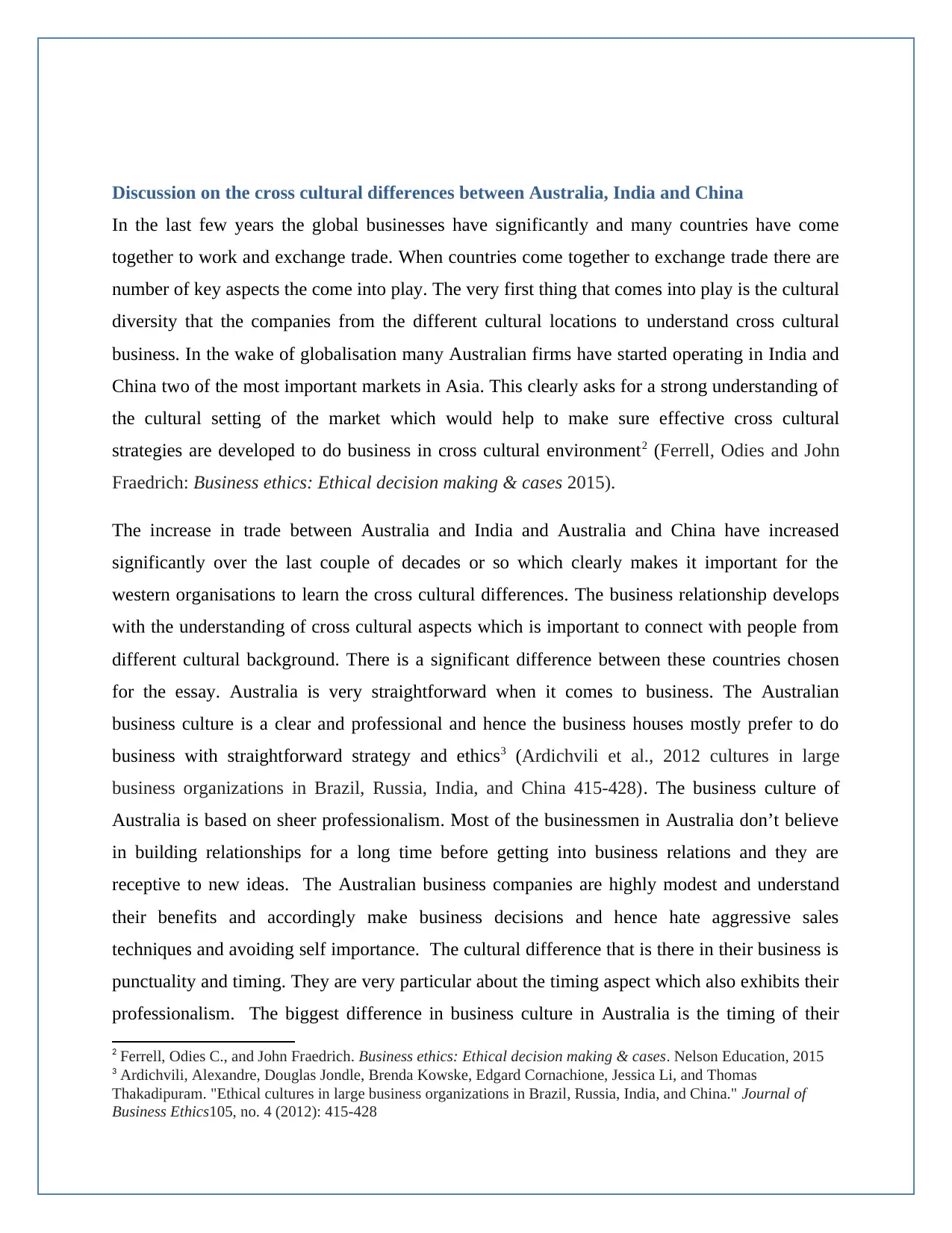
Discussion on the cross cultural differences between Australia, India and China
In the last few years the global businesses have significantly and many countries have come
together to work and exchange trade. When countries come together to exchange trade there are
number of key aspects the come into play. The very first thing that comes into play is the cultural
diversity that the companies from the different cultural locations to understand cross cultural
business. In the wake of globalisation many Australian firms have started operating in India and
China two of the most important markets in Asia. This clearly asks for a strong understanding of
the cultural setting of the market which would help to make sure effective cross cultural
strategies are developed to do business in cross cultural environment2 (Ferrell, Odies and John
Fraedrich: Business ethics: Ethical decision making & cases 2015).
The increase in trade between Australia and India and Australia and China have increased
significantly over the last couple of decades or so which clearly makes it important for the
western organisations to learn the cross cultural differences. The business relationship develops
with the understanding of cross cultural aspects which is important to connect with people from
different cultural background. There is a significant difference between these countries chosen
for the essay. Australia is very straightforward when it comes to business. The Australian
business culture is a clear and professional and hence the business houses mostly prefer to do
business with straightforward strategy and ethics3 (Ardichvili et al., 2012 cultures in large
business organizations in Brazil, Russia, India, and China 415-428). The business culture of
Australia is based on sheer professionalism. Most of the businessmen in Australia don’t believe
in building relationships for a long time before getting into business relations and they are
receptive to new ideas. The Australian business companies are highly modest and understand
their benefits and accordingly make business decisions and hence hate aggressive sales
techniques and avoiding self importance. The cultural difference that is there in their business is
punctuality and timing. They are very particular about the timing aspect which also exhibits their
professionalism. The biggest difference in business culture in Australia is the timing of their
2 Ferrell, Odies C., and John Fraedrich. Business ethics: Ethical decision making & cases. Nelson Education, 2015
3 Ardichvili, Alexandre, Douglas Jondle, Brenda Kowske, Edgard Cornachione, Jessica Li, and Thomas
Thakadipuram. "Ethical cultures in large business organizations in Brazil, Russia, India, and China." Journal of
Business Ethics105, no. 4 (2012): 415-428
In the last few years the global businesses have significantly and many countries have come
together to work and exchange trade. When countries come together to exchange trade there are
number of key aspects the come into play. The very first thing that comes into play is the cultural
diversity that the companies from the different cultural locations to understand cross cultural
business. In the wake of globalisation many Australian firms have started operating in India and
China two of the most important markets in Asia. This clearly asks for a strong understanding of
the cultural setting of the market which would help to make sure effective cross cultural
strategies are developed to do business in cross cultural environment2 (Ferrell, Odies and John
Fraedrich: Business ethics: Ethical decision making & cases 2015).
The increase in trade between Australia and India and Australia and China have increased
significantly over the last couple of decades or so which clearly makes it important for the
western organisations to learn the cross cultural differences. The business relationship develops
with the understanding of cross cultural aspects which is important to connect with people from
different cultural background. There is a significant difference between these countries chosen
for the essay. Australia is very straightforward when it comes to business. The Australian
business culture is a clear and professional and hence the business houses mostly prefer to do
business with straightforward strategy and ethics3 (Ardichvili et al., 2012 cultures in large
business organizations in Brazil, Russia, India, and China 415-428). The business culture of
Australia is based on sheer professionalism. Most of the businessmen in Australia don’t believe
in building relationships for a long time before getting into business relations and they are
receptive to new ideas. The Australian business companies are highly modest and understand
their benefits and accordingly make business decisions and hence hate aggressive sales
techniques and avoiding self importance. The cultural difference that is there in their business is
punctuality and timing. They are very particular about the timing aspect which also exhibits their
professionalism. The biggest difference in business culture in Australia is the timing of their
2 Ferrell, Odies C., and John Fraedrich. Business ethics: Ethical decision making & cases. Nelson Education, 2015
3 Ardichvili, Alexandre, Douglas Jondle, Brenda Kowske, Edgard Cornachione, Jessica Li, and Thomas
Thakadipuram. "Ethical cultures in large business organizations in Brazil, Russia, India, and China." Journal of
Business Ethics105, no. 4 (2012): 415-428
Secure Best Marks with AI Grader
Need help grading? Try our AI Grader for instant feedback on your assignments.
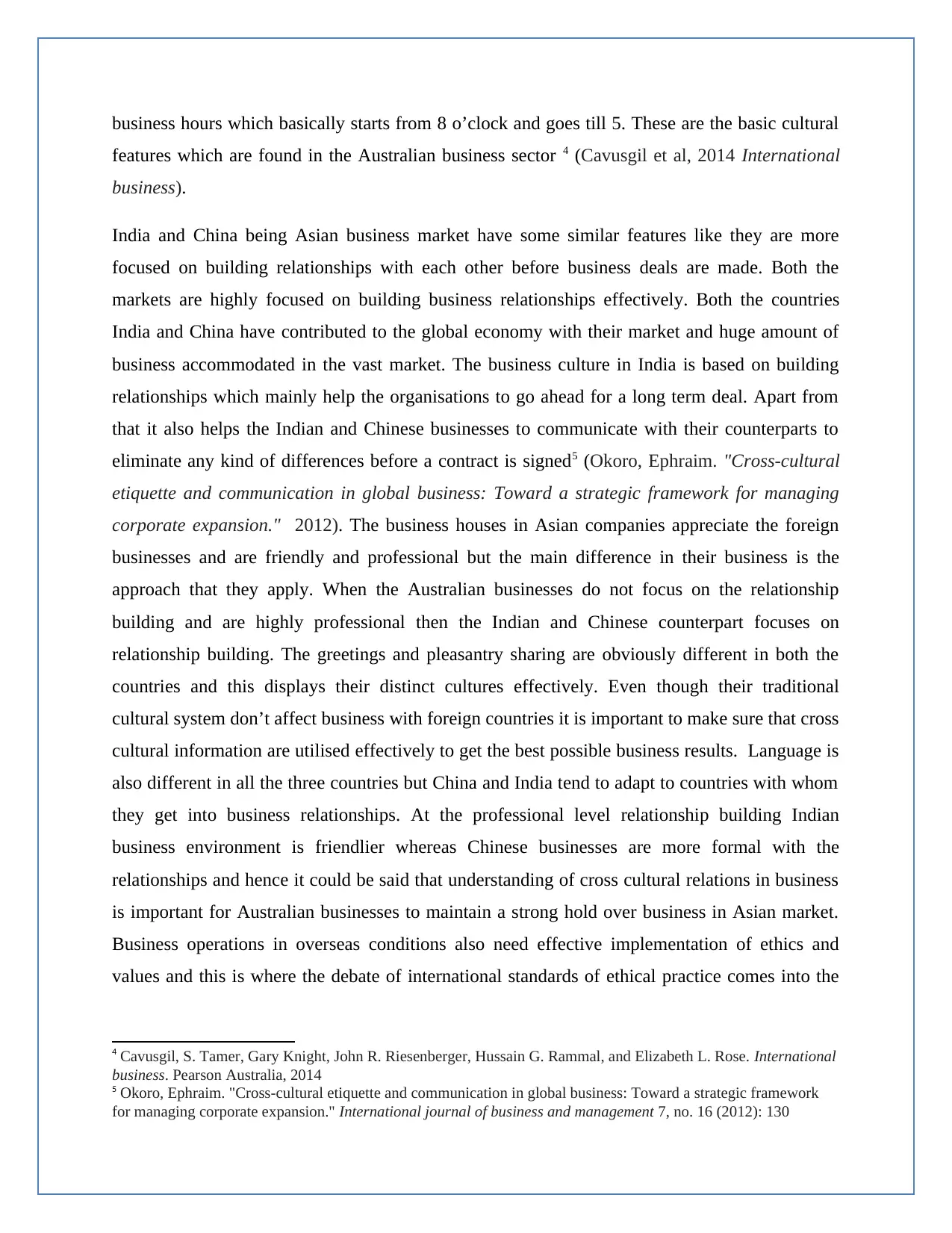
business hours which basically starts from 8 o’clock and goes till 5. These are the basic cultural
features which are found in the Australian business sector 4 (Cavusgil et al, 2014 International
business).
India and China being Asian business market have some similar features like they are more
focused on building relationships with each other before business deals are made. Both the
markets are highly focused on building business relationships effectively. Both the countries
India and China have contributed to the global economy with their market and huge amount of
business accommodated in the vast market. The business culture in India is based on building
relationships which mainly help the organisations to go ahead for a long term deal. Apart from
that it also helps the Indian and Chinese businesses to communicate with their counterparts to
eliminate any kind of differences before a contract is signed5 (Okoro, Ephraim. "Cross-cultural
etiquette and communication in global business: Toward a strategic framework for managing
corporate expansion." 2012). The business houses in Asian companies appreciate the foreign
businesses and are friendly and professional but the main difference in their business is the
approach that they apply. When the Australian businesses do not focus on the relationship
building and are highly professional then the Indian and Chinese counterpart focuses on
relationship building. The greetings and pleasantry sharing are obviously different in both the
countries and this displays their distinct cultures effectively. Even though their traditional
cultural system don’t affect business with foreign countries it is important to make sure that cross
cultural information are utilised effectively to get the best possible business results. Language is
also different in all the three countries but China and India tend to adapt to countries with whom
they get into business relationships. At the professional level relationship building Indian
business environment is friendlier whereas Chinese businesses are more formal with the
relationships and hence it could be said that understanding of cross cultural relations in business
is important for Australian businesses to maintain a strong hold over business in Asian market.
Business operations in overseas conditions also need effective implementation of ethics and
values and this is where the debate of international standards of ethical practice comes into the
4 Cavusgil, S. Tamer, Gary Knight, John R. Riesenberger, Hussain G. Rammal, and Elizabeth L. Rose. International
business. Pearson Australia, 2014
5 Okoro, Ephraim. "Cross-cultural etiquette and communication in global business: Toward a strategic framework
for managing corporate expansion." International journal of business and management 7, no. 16 (2012): 130
features which are found in the Australian business sector 4 (Cavusgil et al, 2014 International
business).
India and China being Asian business market have some similar features like they are more
focused on building relationships with each other before business deals are made. Both the
markets are highly focused on building business relationships effectively. Both the countries
India and China have contributed to the global economy with their market and huge amount of
business accommodated in the vast market. The business culture in India is based on building
relationships which mainly help the organisations to go ahead for a long term deal. Apart from
that it also helps the Indian and Chinese businesses to communicate with their counterparts to
eliminate any kind of differences before a contract is signed5 (Okoro, Ephraim. "Cross-cultural
etiquette and communication in global business: Toward a strategic framework for managing
corporate expansion." 2012). The business houses in Asian companies appreciate the foreign
businesses and are friendly and professional but the main difference in their business is the
approach that they apply. When the Australian businesses do not focus on the relationship
building and are highly professional then the Indian and Chinese counterpart focuses on
relationship building. The greetings and pleasantry sharing are obviously different in both the
countries and this displays their distinct cultures effectively. Even though their traditional
cultural system don’t affect business with foreign countries it is important to make sure that cross
cultural information are utilised effectively to get the best possible business results. Language is
also different in all the three countries but China and India tend to adapt to countries with whom
they get into business relationships. At the professional level relationship building Indian
business environment is friendlier whereas Chinese businesses are more formal with the
relationships and hence it could be said that understanding of cross cultural relations in business
is important for Australian businesses to maintain a strong hold over business in Asian market.
Business operations in overseas conditions also need effective implementation of ethics and
values and this is where the debate of international standards of ethical practice comes into the
4 Cavusgil, S. Tamer, Gary Knight, John R. Riesenberger, Hussain G. Rammal, and Elizabeth L. Rose. International
business. Pearson Australia, 2014
5 Okoro, Ephraim. "Cross-cultural etiquette and communication in global business: Toward a strategic framework
for managing corporate expansion." International journal of business and management 7, no. 16 (2012): 130
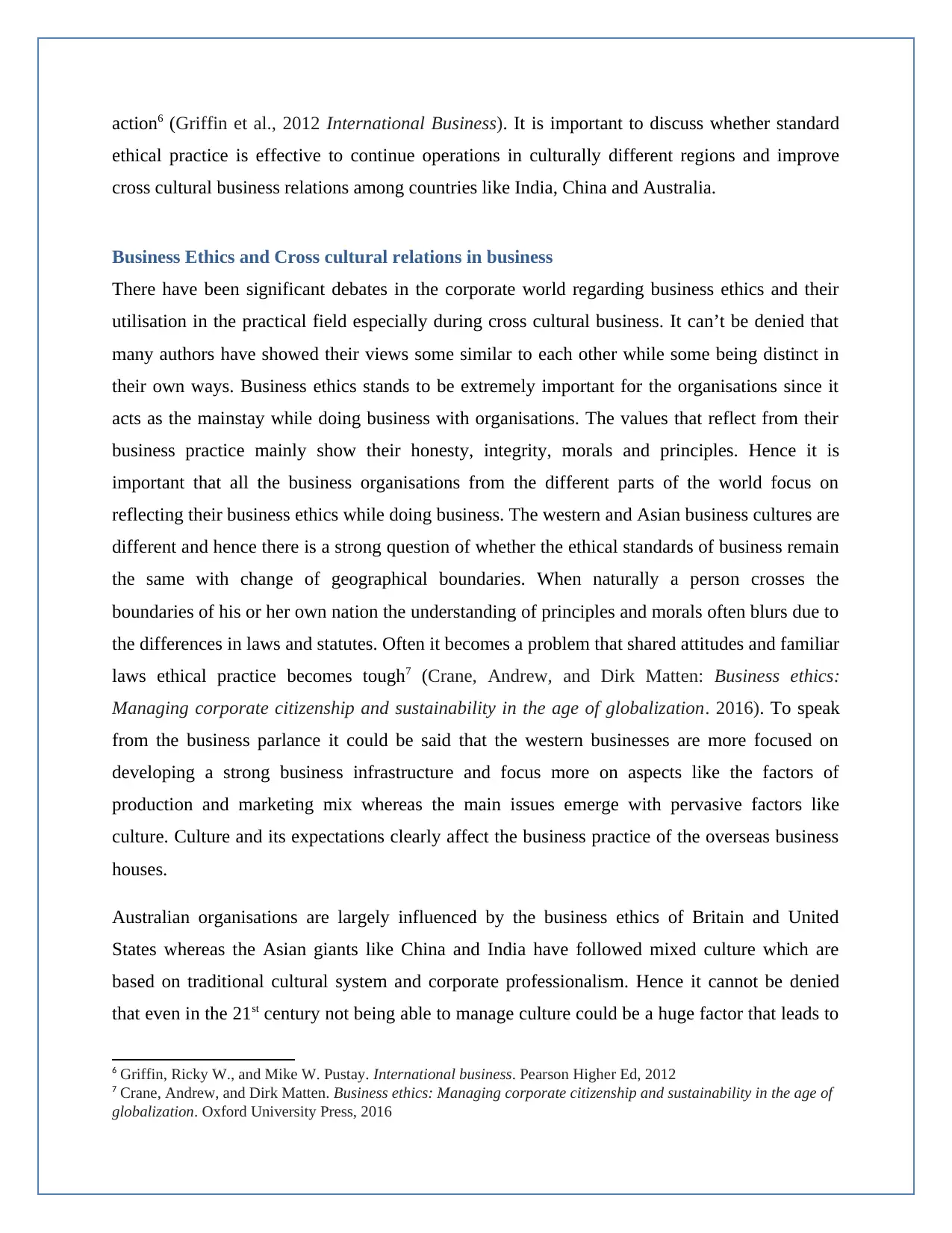
action6 (Griffin et al., 2012 International Business). It is important to discuss whether standard
ethical practice is effective to continue operations in culturally different regions and improve
cross cultural business relations among countries like India, China and Australia.
Business Ethics and Cross cultural relations in business
There have been significant debates in the corporate world regarding business ethics and their
utilisation in the practical field especially during cross cultural business. It can’t be denied that
many authors have showed their views some similar to each other while some being distinct in
their own ways. Business ethics stands to be extremely important for the organisations since it
acts as the mainstay while doing business with organisations. The values that reflect from their
business practice mainly show their honesty, integrity, morals and principles. Hence it is
important that all the business organisations from the different parts of the world focus on
reflecting their business ethics while doing business. The western and Asian business cultures are
different and hence there is a strong question of whether the ethical standards of business remain
the same with change of geographical boundaries. When naturally a person crosses the
boundaries of his or her own nation the understanding of principles and morals often blurs due to
the differences in laws and statutes. Often it becomes a problem that shared attitudes and familiar
laws ethical practice becomes tough7 (Crane, Andrew, and Dirk Matten: Business ethics:
Managing corporate citizenship and sustainability in the age of globalization. 2016). To speak
from the business parlance it could be said that the western businesses are more focused on
developing a strong business infrastructure and focus more on aspects like the factors of
production and marketing mix whereas the main issues emerge with pervasive factors like
culture. Culture and its expectations clearly affect the business practice of the overseas business
houses.
Australian organisations are largely influenced by the business ethics of Britain and United
States whereas the Asian giants like China and India have followed mixed culture which are
based on traditional cultural system and corporate professionalism. Hence it cannot be denied
that even in the 21st century not being able to manage culture could be a huge factor that leads to
6 Griffin, Ricky W., and Mike W. Pustay. International business. Pearson Higher Ed, 2012
7 Crane, Andrew, and Dirk Matten. Business ethics: Managing corporate citizenship and sustainability in the age of
globalization. Oxford University Press, 2016
ethical practice is effective to continue operations in culturally different regions and improve
cross cultural business relations among countries like India, China and Australia.
Business Ethics and Cross cultural relations in business
There have been significant debates in the corporate world regarding business ethics and their
utilisation in the practical field especially during cross cultural business. It can’t be denied that
many authors have showed their views some similar to each other while some being distinct in
their own ways. Business ethics stands to be extremely important for the organisations since it
acts as the mainstay while doing business with organisations. The values that reflect from their
business practice mainly show their honesty, integrity, morals and principles. Hence it is
important that all the business organisations from the different parts of the world focus on
reflecting their business ethics while doing business. The western and Asian business cultures are
different and hence there is a strong question of whether the ethical standards of business remain
the same with change of geographical boundaries. When naturally a person crosses the
boundaries of his or her own nation the understanding of principles and morals often blurs due to
the differences in laws and statutes. Often it becomes a problem that shared attitudes and familiar
laws ethical practice becomes tough7 (Crane, Andrew, and Dirk Matten: Business ethics:
Managing corporate citizenship and sustainability in the age of globalization. 2016). To speak
from the business parlance it could be said that the western businesses are more focused on
developing a strong business infrastructure and focus more on aspects like the factors of
production and marketing mix whereas the main issues emerge with pervasive factors like
culture. Culture and its expectations clearly affect the business practice of the overseas business
houses.
Australian organisations are largely influenced by the business ethics of Britain and United
States whereas the Asian giants like China and India have followed mixed culture which are
based on traditional cultural system and corporate professionalism. Hence it cannot be denied
that even in the 21st century not being able to manage culture could be a huge factor that leads to
6 Griffin, Ricky W., and Mike W. Pustay. International business. Pearson Higher Ed, 2012
7 Crane, Andrew, and Dirk Matten. Business ethics: Managing corporate citizenship and sustainability in the age of
globalization. Oxford University Press, 2016
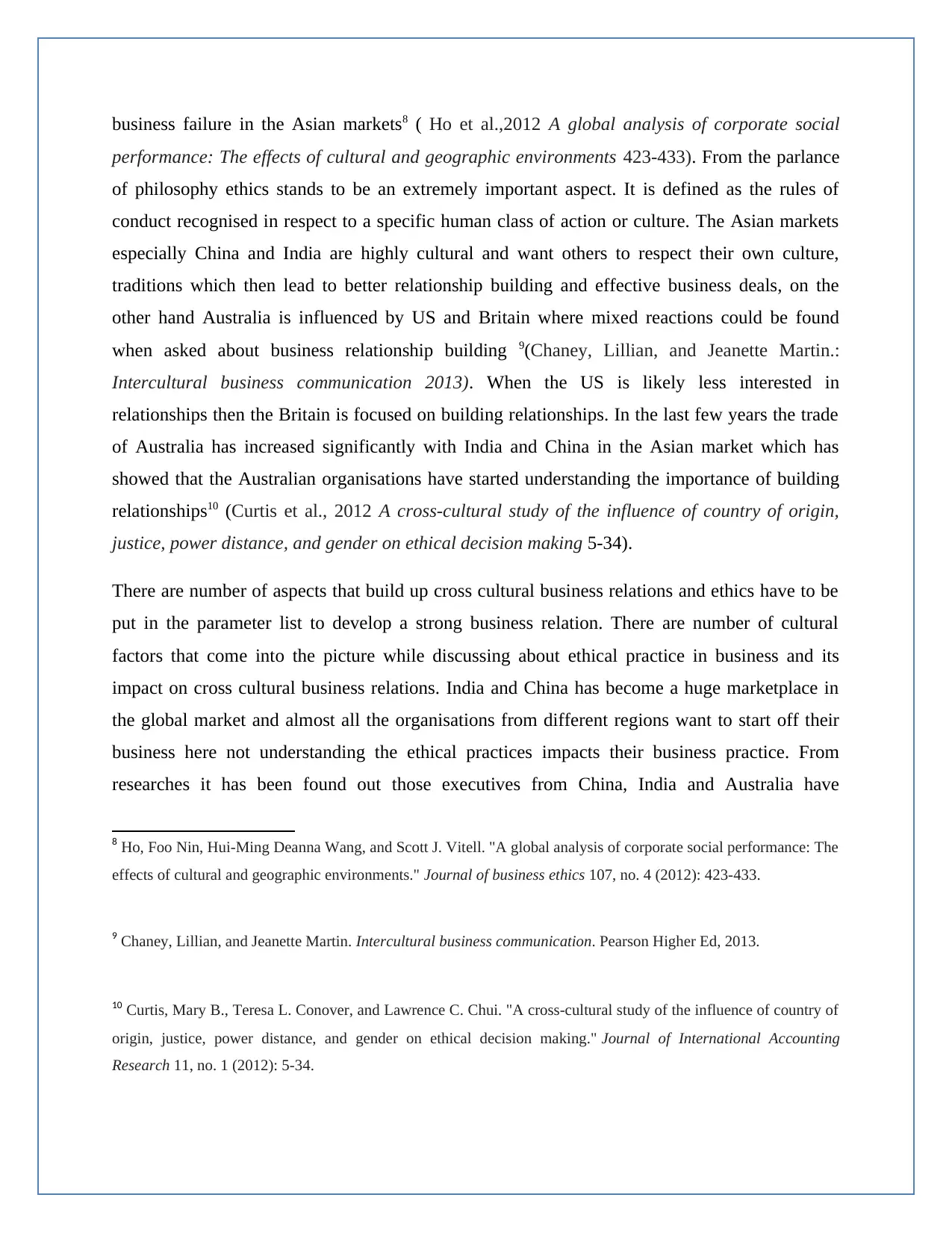
business failure in the Asian markets8 ( Ho et al.,2012 A global analysis of corporate social
performance: The effects of cultural and geographic environments 423-433). From the parlance
of philosophy ethics stands to be an extremely important aspect. It is defined as the rules of
conduct recognised in respect to a specific human class of action or culture. The Asian markets
especially China and India are highly cultural and want others to respect their own culture,
traditions which then lead to better relationship building and effective business deals, on the
other hand Australia is influenced by US and Britain where mixed reactions could be found
when asked about business relationship building 9(Chaney, Lillian, and Jeanette Martin.:
Intercultural business communication 2013). When the US is likely less interested in
relationships then the Britain is focused on building relationships. In the last few years the trade
of Australia has increased significantly with India and China in the Asian market which has
showed that the Australian organisations have started understanding the importance of building
relationships10 (Curtis et al., 2012 A cross-cultural study of the influence of country of origin,
justice, power distance, and gender on ethical decision making 5-34).
There are number of aspects that build up cross cultural business relations and ethics have to be
put in the parameter list to develop a strong business relation. There are number of cultural
factors that come into the picture while discussing about ethical practice in business and its
impact on cross cultural business relations. India and China has become a huge marketplace in
the global market and almost all the organisations from different regions want to start off their
business here not understanding the ethical practices impacts their business practice. From
researches it has been found out those executives from China, India and Australia have
8 Ho, Foo Nin, Hui-Ming Deanna Wang, and Scott J. Vitell. "A global analysis of corporate social performance: The
effects of cultural and geographic environments." Journal of business ethics 107, no. 4 (2012): 423-433.
9 Chaney, Lillian, and Jeanette Martin. Intercultural business communication. Pearson Higher Ed, 2013.
10 Curtis, Mary B., Teresa L. Conover, and Lawrence C. Chui. "A cross-cultural study of the influence of country of
origin, justice, power distance, and gender on ethical decision making." Journal of International Accounting
Research 11, no. 1 (2012): 5-34.
performance: The effects of cultural and geographic environments 423-433). From the parlance
of philosophy ethics stands to be an extremely important aspect. It is defined as the rules of
conduct recognised in respect to a specific human class of action or culture. The Asian markets
especially China and India are highly cultural and want others to respect their own culture,
traditions which then lead to better relationship building and effective business deals, on the
other hand Australia is influenced by US and Britain where mixed reactions could be found
when asked about business relationship building 9(Chaney, Lillian, and Jeanette Martin.:
Intercultural business communication 2013). When the US is likely less interested in
relationships then the Britain is focused on building relationships. In the last few years the trade
of Australia has increased significantly with India and China in the Asian market which has
showed that the Australian organisations have started understanding the importance of building
relationships10 (Curtis et al., 2012 A cross-cultural study of the influence of country of origin,
justice, power distance, and gender on ethical decision making 5-34).
There are number of aspects that build up cross cultural business relations and ethics have to be
put in the parameter list to develop a strong business relation. There are number of cultural
factors that come into the picture while discussing about ethical practice in business and its
impact on cross cultural business relations. India and China has become a huge marketplace in
the global market and almost all the organisations from different regions want to start off their
business here not understanding the ethical practices impacts their business practice. From
researches it has been found out those executives from China, India and Australia have
8 Ho, Foo Nin, Hui-Ming Deanna Wang, and Scott J. Vitell. "A global analysis of corporate social performance: The
effects of cultural and geographic environments." Journal of business ethics 107, no. 4 (2012): 423-433.
9 Chaney, Lillian, and Jeanette Martin. Intercultural business communication. Pearson Higher Ed, 2013.
10 Curtis, Mary B., Teresa L. Conover, and Lawrence C. Chui. "A cross-cultural study of the influence of country of
origin, justice, power distance, and gender on ethical decision making." Journal of International Accounting
Research 11, no. 1 (2012): 5-34.
Paraphrase This Document
Need a fresh take? Get an instant paraphrase of this document with our AI Paraphraser
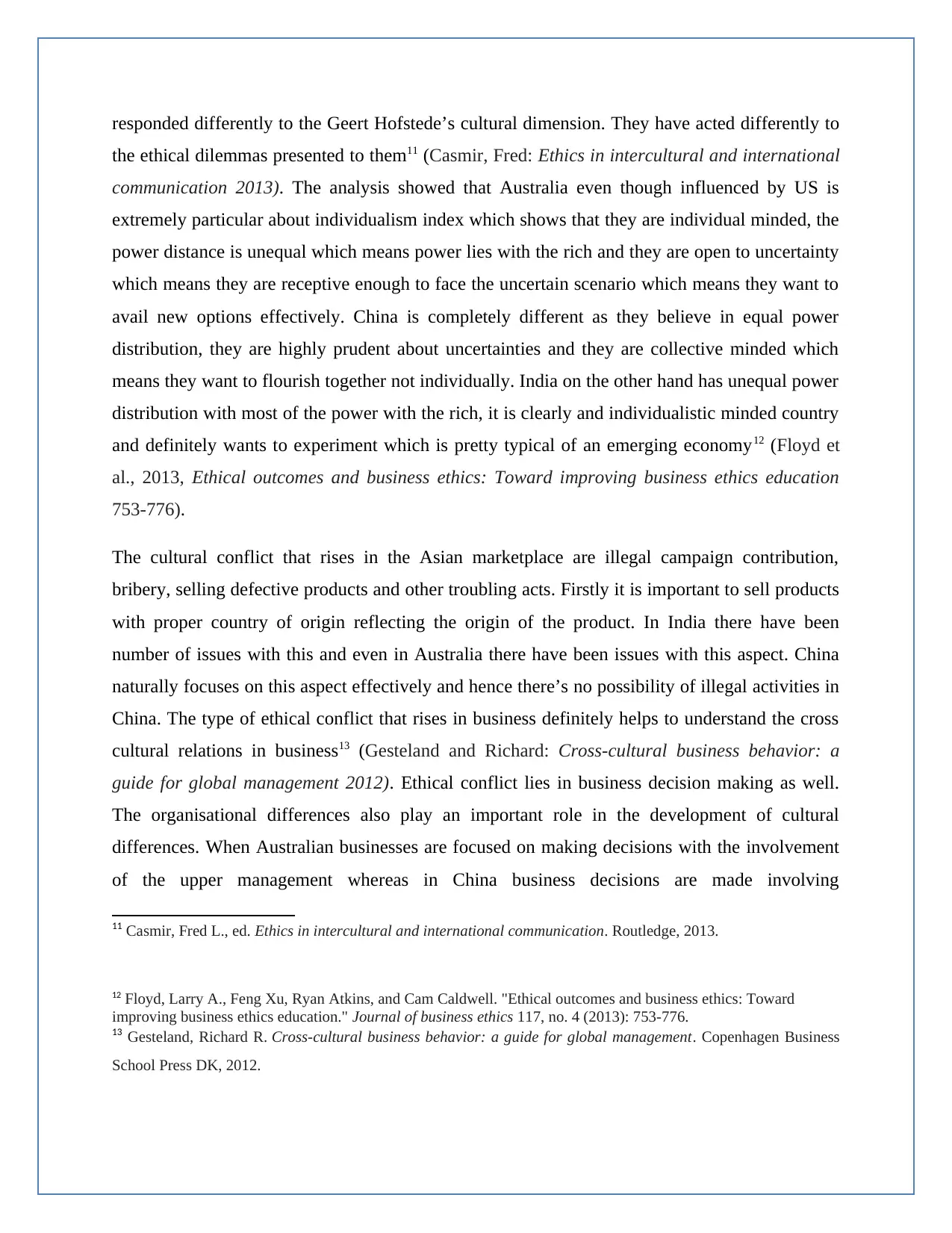
responded differently to the Geert Hofstede’s cultural dimension. They have acted differently to
the ethical dilemmas presented to them11 (Casmir, Fred: Ethics in intercultural and international
communication 2013). The analysis showed that Australia even though influenced by US is
extremely particular about individualism index which shows that they are individual minded, the
power distance is unequal which means power lies with the rich and they are open to uncertainty
which means they are receptive enough to face the uncertain scenario which means they want to
avail new options effectively. China is completely different as they believe in equal power
distribution, they are highly prudent about uncertainties and they are collective minded which
means they want to flourish together not individually. India on the other hand has unequal power
distribution with most of the power with the rich, it is clearly and individualistic minded country
and definitely wants to experiment which is pretty typical of an emerging economy12 (Floyd et
al., 2013, Ethical outcomes and business ethics: Toward improving business ethics education
753-776).
The cultural conflict that rises in the Asian marketplace are illegal campaign contribution,
bribery, selling defective products and other troubling acts. Firstly it is important to sell products
with proper country of origin reflecting the origin of the product. In India there have been
number of issues with this and even in Australia there have been issues with this aspect. China
naturally focuses on this aspect effectively and hence there’s no possibility of illegal activities in
China. The type of ethical conflict that rises in business definitely helps to understand the cross
cultural relations in business13 (Gesteland and Richard: Cross-cultural business behavior: a
guide for global management 2012). Ethical conflict lies in business decision making as well.
The organisational differences also play an important role in the development of cultural
differences. When Australian businesses are focused on making decisions with the involvement
of the upper management whereas in China business decisions are made involving
11 Casmir, Fred L., ed. Ethics in intercultural and international communication. Routledge, 2013.
12 Floyd, Larry A., Feng Xu, Ryan Atkins, and Cam Caldwell. "Ethical outcomes and business ethics: Toward
improving business ethics education." Journal of business ethics 117, no. 4 (2013): 753-776.
13 Gesteland, Richard R. Cross-cultural business behavior: a guide for global management. Copenhagen Business
School Press DK, 2012.
the ethical dilemmas presented to them11 (Casmir, Fred: Ethics in intercultural and international
communication 2013). The analysis showed that Australia even though influenced by US is
extremely particular about individualism index which shows that they are individual minded, the
power distance is unequal which means power lies with the rich and they are open to uncertainty
which means they are receptive enough to face the uncertain scenario which means they want to
avail new options effectively. China is completely different as they believe in equal power
distribution, they are highly prudent about uncertainties and they are collective minded which
means they want to flourish together not individually. India on the other hand has unequal power
distribution with most of the power with the rich, it is clearly and individualistic minded country
and definitely wants to experiment which is pretty typical of an emerging economy12 (Floyd et
al., 2013, Ethical outcomes and business ethics: Toward improving business ethics education
753-776).
The cultural conflict that rises in the Asian marketplace are illegal campaign contribution,
bribery, selling defective products and other troubling acts. Firstly it is important to sell products
with proper country of origin reflecting the origin of the product. In India there have been
number of issues with this and even in Australia there have been issues with this aspect. China
naturally focuses on this aspect effectively and hence there’s no possibility of illegal activities in
China. The type of ethical conflict that rises in business definitely helps to understand the cross
cultural relations in business13 (Gesteland and Richard: Cross-cultural business behavior: a
guide for global management 2012). Ethical conflict lies in business decision making as well.
The organisational differences also play an important role in the development of cultural
differences. When Australian businesses are focused on making decisions with the involvement
of the upper management whereas in China business decisions are made involving
11 Casmir, Fred L., ed. Ethics in intercultural and international communication. Routledge, 2013.
12 Floyd, Larry A., Feng Xu, Ryan Atkins, and Cam Caldwell. "Ethical outcomes and business ethics: Toward
improving business ethics education." Journal of business ethics 117, no. 4 (2013): 753-776.
13 Gesteland, Richard R. Cross-cultural business behavior: a guide for global management. Copenhagen Business
School Press DK, 2012.
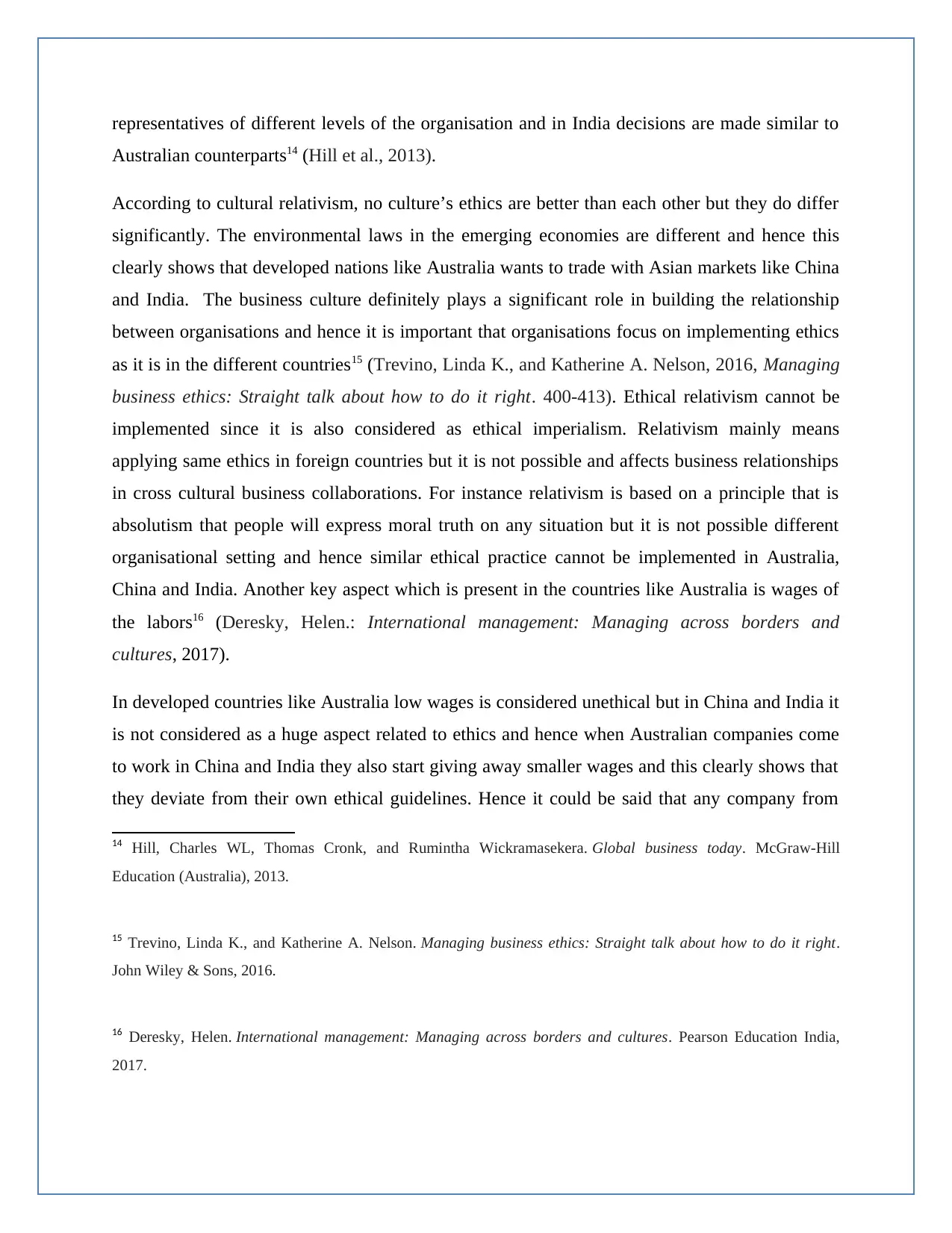
representatives of different levels of the organisation and in India decisions are made similar to
Australian counterparts14 (Hill et al., 2013).
According to cultural relativism, no culture’s ethics are better than each other but they do differ
significantly. The environmental laws in the emerging economies are different and hence this
clearly shows that developed nations like Australia wants to trade with Asian markets like China
and India. The business culture definitely plays a significant role in building the relationship
between organisations and hence it is important that organisations focus on implementing ethics
as it is in the different countries15 (Trevino, Linda K., and Katherine A. Nelson, 2016, Managing
business ethics: Straight talk about how to do it right. 400-413). Ethical relativism cannot be
implemented since it is also considered as ethical imperialism. Relativism mainly means
applying same ethics in foreign countries but it is not possible and affects business relationships
in cross cultural business collaborations. For instance relativism is based on a principle that is
absolutism that people will express moral truth on any situation but it is not possible different
organisational setting and hence similar ethical practice cannot be implemented in Australia,
China and India. Another key aspect which is present in the countries like Australia is wages of
the labors16 (Deresky, Helen.: International management: Managing across borders and
cultures, 2017).
In developed countries like Australia low wages is considered unethical but in China and India it
is not considered as a huge aspect related to ethics and hence when Australian companies come
to work in China and India they also start giving away smaller wages and this clearly shows that
they deviate from their own ethical guidelines. Hence it could be said that any company from
14 Hill, Charles WL, Thomas Cronk, and Rumintha Wickramasekera. Global business today. McGraw-Hill
Education (Australia), 2013.
15 Trevino, Linda K., and Katherine A. Nelson. Managing business ethics: Straight talk about how to do it right.
John Wiley & Sons, 2016.
16 Deresky, Helen. International management: Managing across borders and cultures. Pearson Education India,
2017.
Australian counterparts14 (Hill et al., 2013).
According to cultural relativism, no culture’s ethics are better than each other but they do differ
significantly. The environmental laws in the emerging economies are different and hence this
clearly shows that developed nations like Australia wants to trade with Asian markets like China
and India. The business culture definitely plays a significant role in building the relationship
between organisations and hence it is important that organisations focus on implementing ethics
as it is in the different countries15 (Trevino, Linda K., and Katherine A. Nelson, 2016, Managing
business ethics: Straight talk about how to do it right. 400-413). Ethical relativism cannot be
implemented since it is also considered as ethical imperialism. Relativism mainly means
applying same ethics in foreign countries but it is not possible and affects business relationships
in cross cultural business collaborations. For instance relativism is based on a principle that is
absolutism that people will express moral truth on any situation but it is not possible different
organisational setting and hence similar ethical practice cannot be implemented in Australia,
China and India. Another key aspect which is present in the countries like Australia is wages of
the labors16 (Deresky, Helen.: International management: Managing across borders and
cultures, 2017).
In developed countries like Australia low wages is considered unethical but in China and India it
is not considered as a huge aspect related to ethics and hence when Australian companies come
to work in China and India they also start giving away smaller wages and this clearly shows that
they deviate from their own ethical guidelines. Hence it could be said that any company from
14 Hill, Charles WL, Thomas Cronk, and Rumintha Wickramasekera. Global business today. McGraw-Hill
Education (Australia), 2013.
15 Trevino, Linda K., and Katherine A. Nelson. Managing business ethics: Straight talk about how to do it right.
John Wiley & Sons, 2016.
16 Deresky, Helen. International management: Managing across borders and cultures. Pearson Education India,
2017.
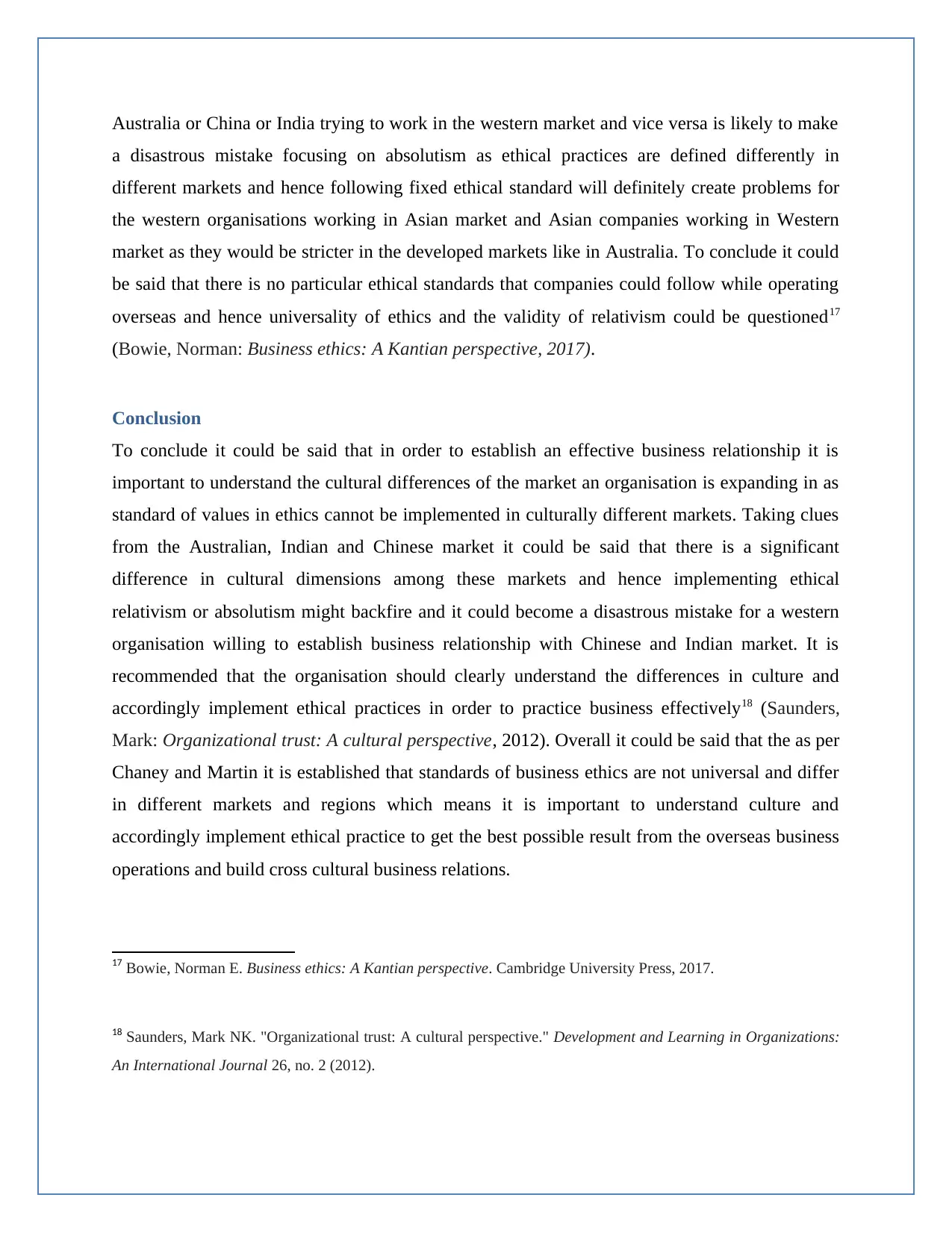
Australia or China or India trying to work in the western market and vice versa is likely to make
a disastrous mistake focusing on absolutism as ethical practices are defined differently in
different markets and hence following fixed ethical standard will definitely create problems for
the western organisations working in Asian market and Asian companies working in Western
market as they would be stricter in the developed markets like in Australia. To conclude it could
be said that there is no particular ethical standards that companies could follow while operating
overseas and hence universality of ethics and the validity of relativism could be questioned17
(Bowie, Norman: Business ethics: A Kantian perspective, 2017).
Conclusion
To conclude it could be said that in order to establish an effective business relationship it is
important to understand the cultural differences of the market an organisation is expanding in as
standard of values in ethics cannot be implemented in culturally different markets. Taking clues
from the Australian, Indian and Chinese market it could be said that there is a significant
difference in cultural dimensions among these markets and hence implementing ethical
relativism or absolutism might backfire and it could become a disastrous mistake for a western
organisation willing to establish business relationship with Chinese and Indian market. It is
recommended that the organisation should clearly understand the differences in culture and
accordingly implement ethical practices in order to practice business effectively18 (Saunders,
Mark: Organizational trust: A cultural perspective, 2012). Overall it could be said that the as per
Chaney and Martin it is established that standards of business ethics are not universal and differ
in different markets and regions which means it is important to understand culture and
accordingly implement ethical practice to get the best possible result from the overseas business
operations and build cross cultural business relations.
17 Bowie, Norman E. Business ethics: A Kantian perspective. Cambridge University Press, 2017.
18 Saunders, Mark NK. "Organizational trust: A cultural perspective." Development and Learning in Organizations:
An International Journal 26, no. 2 (2012).
a disastrous mistake focusing on absolutism as ethical practices are defined differently in
different markets and hence following fixed ethical standard will definitely create problems for
the western organisations working in Asian market and Asian companies working in Western
market as they would be stricter in the developed markets like in Australia. To conclude it could
be said that there is no particular ethical standards that companies could follow while operating
overseas and hence universality of ethics and the validity of relativism could be questioned17
(Bowie, Norman: Business ethics: A Kantian perspective, 2017).
Conclusion
To conclude it could be said that in order to establish an effective business relationship it is
important to understand the cultural differences of the market an organisation is expanding in as
standard of values in ethics cannot be implemented in culturally different markets. Taking clues
from the Australian, Indian and Chinese market it could be said that there is a significant
difference in cultural dimensions among these markets and hence implementing ethical
relativism or absolutism might backfire and it could become a disastrous mistake for a western
organisation willing to establish business relationship with Chinese and Indian market. It is
recommended that the organisation should clearly understand the differences in culture and
accordingly implement ethical practices in order to practice business effectively18 (Saunders,
Mark: Organizational trust: A cultural perspective, 2012). Overall it could be said that the as per
Chaney and Martin it is established that standards of business ethics are not universal and differ
in different markets and regions which means it is important to understand culture and
accordingly implement ethical practice to get the best possible result from the overseas business
operations and build cross cultural business relations.
17 Bowie, Norman E. Business ethics: A Kantian perspective. Cambridge University Press, 2017.
18 Saunders, Mark NK. "Organizational trust: A cultural perspective." Development and Learning in Organizations:
An International Journal 26, no. 2 (2012).
Secure Best Marks with AI Grader
Need help grading? Try our AI Grader for instant feedback on your assignments.
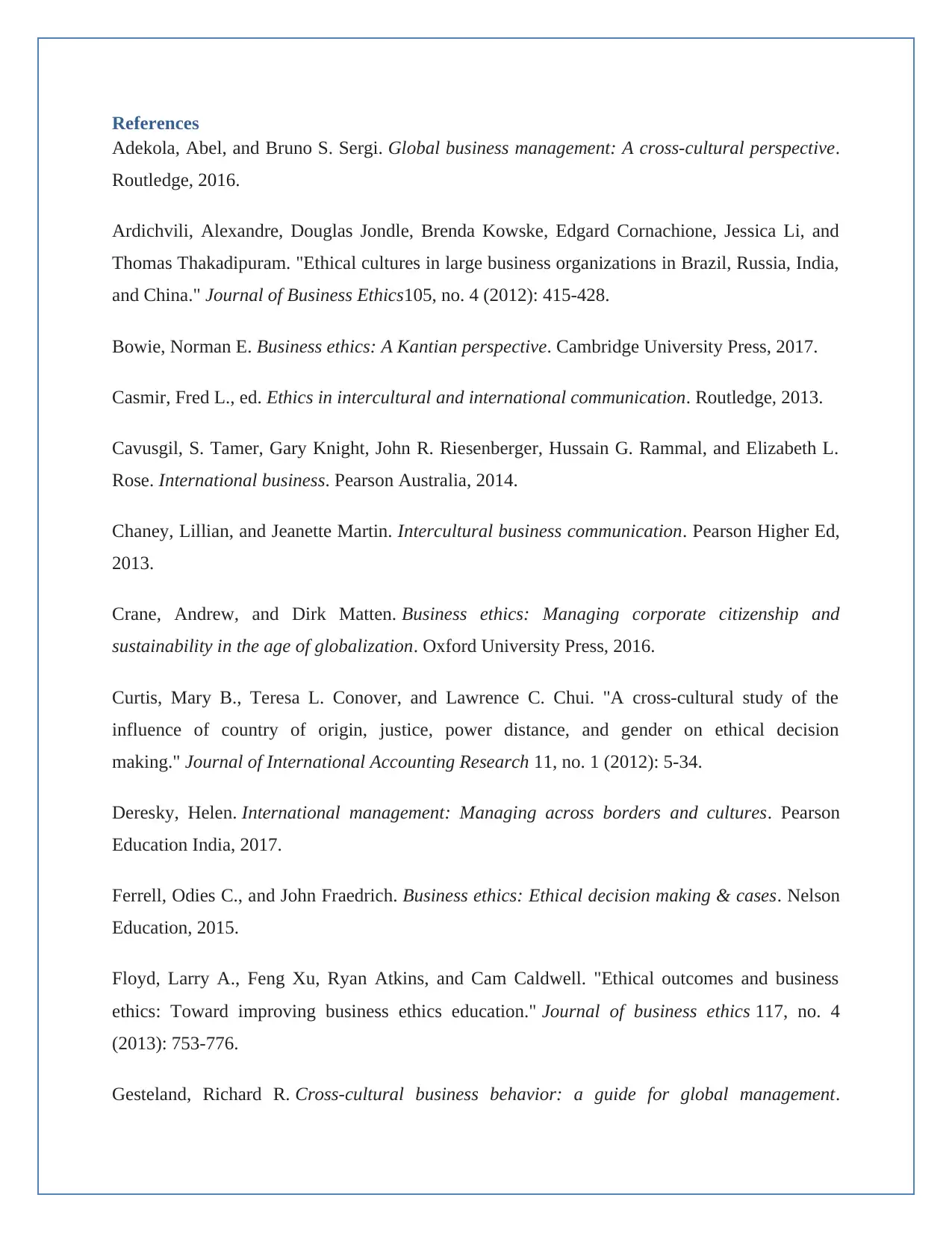
References
Adekola, Abel, and Bruno S. Sergi. Global business management: A cross-cultural perspective.
Routledge, 2016.
Ardichvili, Alexandre, Douglas Jondle, Brenda Kowske, Edgard Cornachione, Jessica Li, and
Thomas Thakadipuram. "Ethical cultures in large business organizations in Brazil, Russia, India,
and China." Journal of Business Ethics105, no. 4 (2012): 415-428.
Bowie, Norman E. Business ethics: A Kantian perspective. Cambridge University Press, 2017.
Casmir, Fred L., ed. Ethics in intercultural and international communication. Routledge, 2013.
Cavusgil, S. Tamer, Gary Knight, John R. Riesenberger, Hussain G. Rammal, and Elizabeth L.
Rose. International business. Pearson Australia, 2014.
Chaney, Lillian, and Jeanette Martin. Intercultural business communication. Pearson Higher Ed,
2013.
Crane, Andrew, and Dirk Matten. Business ethics: Managing corporate citizenship and
sustainability in the age of globalization. Oxford University Press, 2016.
Curtis, Mary B., Teresa L. Conover, and Lawrence C. Chui. "A cross-cultural study of the
influence of country of origin, justice, power distance, and gender on ethical decision
making." Journal of International Accounting Research 11, no. 1 (2012): 5-34.
Deresky, Helen. International management: Managing across borders and cultures. Pearson
Education India, 2017.
Ferrell, Odies C., and John Fraedrich. Business ethics: Ethical decision making & cases. Nelson
Education, 2015.
Floyd, Larry A., Feng Xu, Ryan Atkins, and Cam Caldwell. "Ethical outcomes and business
ethics: Toward improving business ethics education." Journal of business ethics 117, no. 4
(2013): 753-776.
Gesteland, Richard R. Cross-cultural business behavior: a guide for global management.
Adekola, Abel, and Bruno S. Sergi. Global business management: A cross-cultural perspective.
Routledge, 2016.
Ardichvili, Alexandre, Douglas Jondle, Brenda Kowske, Edgard Cornachione, Jessica Li, and
Thomas Thakadipuram. "Ethical cultures in large business organizations in Brazil, Russia, India,
and China." Journal of Business Ethics105, no. 4 (2012): 415-428.
Bowie, Norman E. Business ethics: A Kantian perspective. Cambridge University Press, 2017.
Casmir, Fred L., ed. Ethics in intercultural and international communication. Routledge, 2013.
Cavusgil, S. Tamer, Gary Knight, John R. Riesenberger, Hussain G. Rammal, and Elizabeth L.
Rose. International business. Pearson Australia, 2014.
Chaney, Lillian, and Jeanette Martin. Intercultural business communication. Pearson Higher Ed,
2013.
Crane, Andrew, and Dirk Matten. Business ethics: Managing corporate citizenship and
sustainability in the age of globalization. Oxford University Press, 2016.
Curtis, Mary B., Teresa L. Conover, and Lawrence C. Chui. "A cross-cultural study of the
influence of country of origin, justice, power distance, and gender on ethical decision
making." Journal of International Accounting Research 11, no. 1 (2012): 5-34.
Deresky, Helen. International management: Managing across borders and cultures. Pearson
Education India, 2017.
Ferrell, Odies C., and John Fraedrich. Business ethics: Ethical decision making & cases. Nelson
Education, 2015.
Floyd, Larry A., Feng Xu, Ryan Atkins, and Cam Caldwell. "Ethical outcomes and business
ethics: Toward improving business ethics education." Journal of business ethics 117, no. 4
(2013): 753-776.
Gesteland, Richard R. Cross-cultural business behavior: a guide for global management.
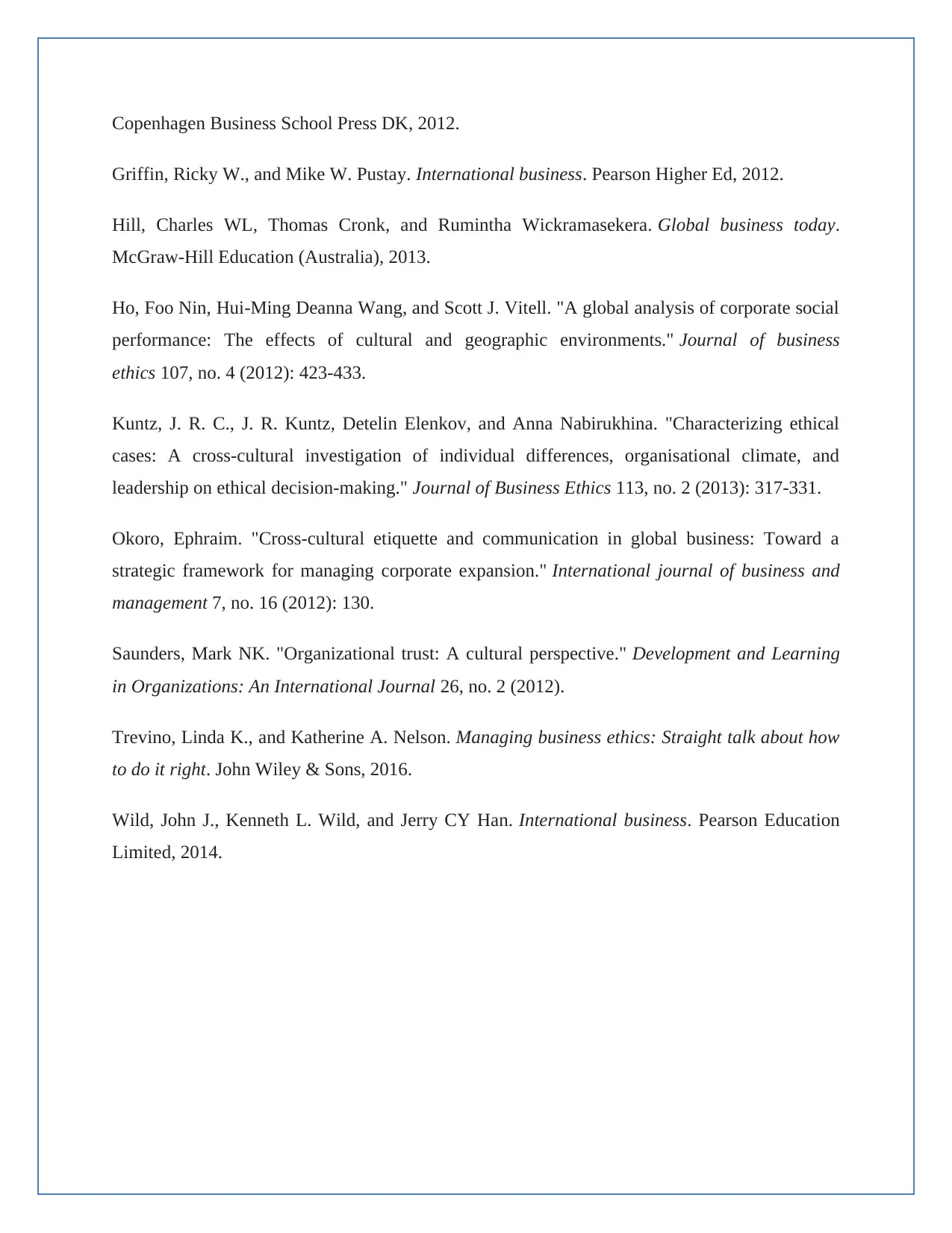
Copenhagen Business School Press DK, 2012.
Griffin, Ricky W., and Mike W. Pustay. International business. Pearson Higher Ed, 2012.
Hill, Charles WL, Thomas Cronk, and Rumintha Wickramasekera. Global business today.
McGraw-Hill Education (Australia), 2013.
Ho, Foo Nin, Hui-Ming Deanna Wang, and Scott J. Vitell. "A global analysis of corporate social
performance: The effects of cultural and geographic environments." Journal of business
ethics 107, no. 4 (2012): 423-433.
Kuntz, J. R. C., J. R. Kuntz, Detelin Elenkov, and Anna Nabirukhina. "Characterizing ethical
cases: A cross-cultural investigation of individual differences, organisational climate, and
leadership on ethical decision-making." Journal of Business Ethics 113, no. 2 (2013): 317-331.
Okoro, Ephraim. "Cross-cultural etiquette and communication in global business: Toward a
strategic framework for managing corporate expansion." International journal of business and
management 7, no. 16 (2012): 130.
Saunders, Mark NK. "Organizational trust: A cultural perspective." Development and Learning
in Organizations: An International Journal 26, no. 2 (2012).
Trevino, Linda K., and Katherine A. Nelson. Managing business ethics: Straight talk about how
to do it right. John Wiley & Sons, 2016.
Wild, John J., Kenneth L. Wild, and Jerry CY Han. International business. Pearson Education
Limited, 2014.
Griffin, Ricky W., and Mike W. Pustay. International business. Pearson Higher Ed, 2012.
Hill, Charles WL, Thomas Cronk, and Rumintha Wickramasekera. Global business today.
McGraw-Hill Education (Australia), 2013.
Ho, Foo Nin, Hui-Ming Deanna Wang, and Scott J. Vitell. "A global analysis of corporate social
performance: The effects of cultural and geographic environments." Journal of business
ethics 107, no. 4 (2012): 423-433.
Kuntz, J. R. C., J. R. Kuntz, Detelin Elenkov, and Anna Nabirukhina. "Characterizing ethical
cases: A cross-cultural investigation of individual differences, organisational climate, and
leadership on ethical decision-making." Journal of Business Ethics 113, no. 2 (2013): 317-331.
Okoro, Ephraim. "Cross-cultural etiquette and communication in global business: Toward a
strategic framework for managing corporate expansion." International journal of business and
management 7, no. 16 (2012): 130.
Saunders, Mark NK. "Organizational trust: A cultural perspective." Development and Learning
in Organizations: An International Journal 26, no. 2 (2012).
Trevino, Linda K., and Katherine A. Nelson. Managing business ethics: Straight talk about how
to do it right. John Wiley & Sons, 2016.
Wild, John J., Kenneth L. Wild, and Jerry CY Han. International business. Pearson Education
Limited, 2014.
1 out of 12
Related Documents
Your All-in-One AI-Powered Toolkit for Academic Success.
+13062052269
info@desklib.com
Available 24*7 on WhatsApp / Email
![[object Object]](/_next/static/media/star-bottom.7253800d.svg)
Unlock your academic potential
© 2024 | Zucol Services PVT LTD | All rights reserved.


